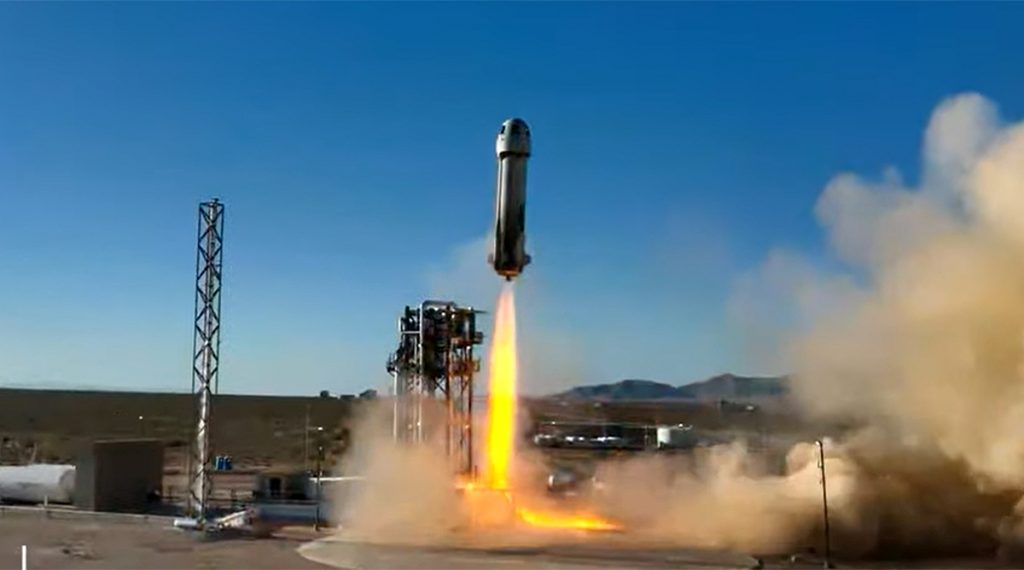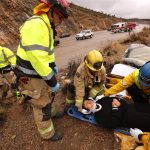It’s been nearly two years since Blue Origin flew humans to space on its New Shepard rocket, but the next six passengers are set to go Sunday as the Jeff Bezos company gets back to the business of space tourism.
The six passengers include former Air Force Capt. Ed Dwight, the first Black astronaut candidate in the 1960s. Others flying are venture capitalist Mason Angel, French microbrewery founder Sylvain Chiron, software engineer and entrepreneur Kenneth Hess, world explorer and retired CPA Carol Schaller, and pilot and holistic wellness entrepreneur Gopi Thotakura, a graduate of Daytona Beach’s Embry-Riddle Aeronautical University.
Dwight was chosen by President John F. Kennedy in 1961 to enter an Air Force flight training program that was one of the ways to join NASA’s astronaut corps, but despite graduating from the Aerospace Research Pilot School, he was not chosen, and retired from military service in 1966. Now 90, he has since become a sculptor with Black history the main theme among his subjects with more than 130 public installations throughout the U.S. and Canada.
The price to fly with Blue Origin has not been made public, but Dwight’s seat is being sponsored by nonprofit Space for Humanity, which has sent up several previous New Shepard passengers, as well as contributions from the Jaison and Jamie Robinson Foundation.
The six will climb aboard the small capsule and take off on a short suborbital trip to space from Blue Origin’s Launch Site One in West Texas on what will be New Shepard’s 25th flight since 2005. The launch window for the NS-25 mission opens at 9:30 a.m. EDT Sunday with live stream coverage on BlueOrigin.com starting about 40 minutes before liftoff.
Flights last a little more than 10 minutes with passengers able to unstrap and enjoy a few minutes of weightlessness before a return to Earth with a parachute-assisted landing just a few miles from the launch site.
The rocket last flew on a crewed mission in August 2022, but a month later the first stage booster on an uncrewed flight suffered an explosion.
The capsule jettisoned as designed and made a safe landing, but the rocket was grounded by the Federal Aviation Administration. The booster on that flight had never been used for human launches, but Blue Origin’s investigation into the incident led to changes in booster design.
New Shepard returned to flight last December, flying once again on an uncrewed mission.
Related Articles
NASA researchers bid farewell to ‘flying laboratory’ at Ames Research Center
Photos: Aurora borealis from the Bay Area and far beyond
Solar storm brings northern lights to Bay Area; no serious disruption to power grid reported
Huge solar storm: Northern lights possible in California, sunspot visible with glasses
NASA watchdog report: 100+ cracks on heat shield biggest threat to human moon mission
That now sets up the seventh trip to space with passengers on board. The first, which included Bezos, launched from Blue Origin’s West Texas facility in summer 2021 followed by five more trips to suborbital space above the Karman line, which is 62 miles (100 km) altitude, the internationally recognized limit for having gone into space.
In total, Blue Origin has flown 31 people to suborbital space for the 10- to 11-minute rides. They have included Star Trek’s William Shatner, NFL Hall of Famer and “Good Morning America” co-host Michael Strahan and Laura Shepard Churchley, daughter of Alan Shepard, the first American in space for whom the rocket is named.
Three of its customers have been from Central Florida with Winter Park power couple Marc and Sharon Hagle who flew in March 2022 followed by Brevard County millionaire Steve Young in August 2022.
The Hagles are slated to fly again, as soon as this year, and Sharon Hagle’s nonprofit SpaceKids Global, is running a contest seeking student journalists to cover the flight and tour Blue Origin’s Space Coast rocket factory where it’s building the larger New Glenn rocket.
The New Shepard program is just one facet of Blue Origin’s space pursuits. New Glenn is a heavy-lift rocket slated to fly for the first time this year from Cape Canaveral Space Force Station.
The company also is the lead on the second of NASA’s chosen providers for a human landing system for future Artemis missions to the moon.


